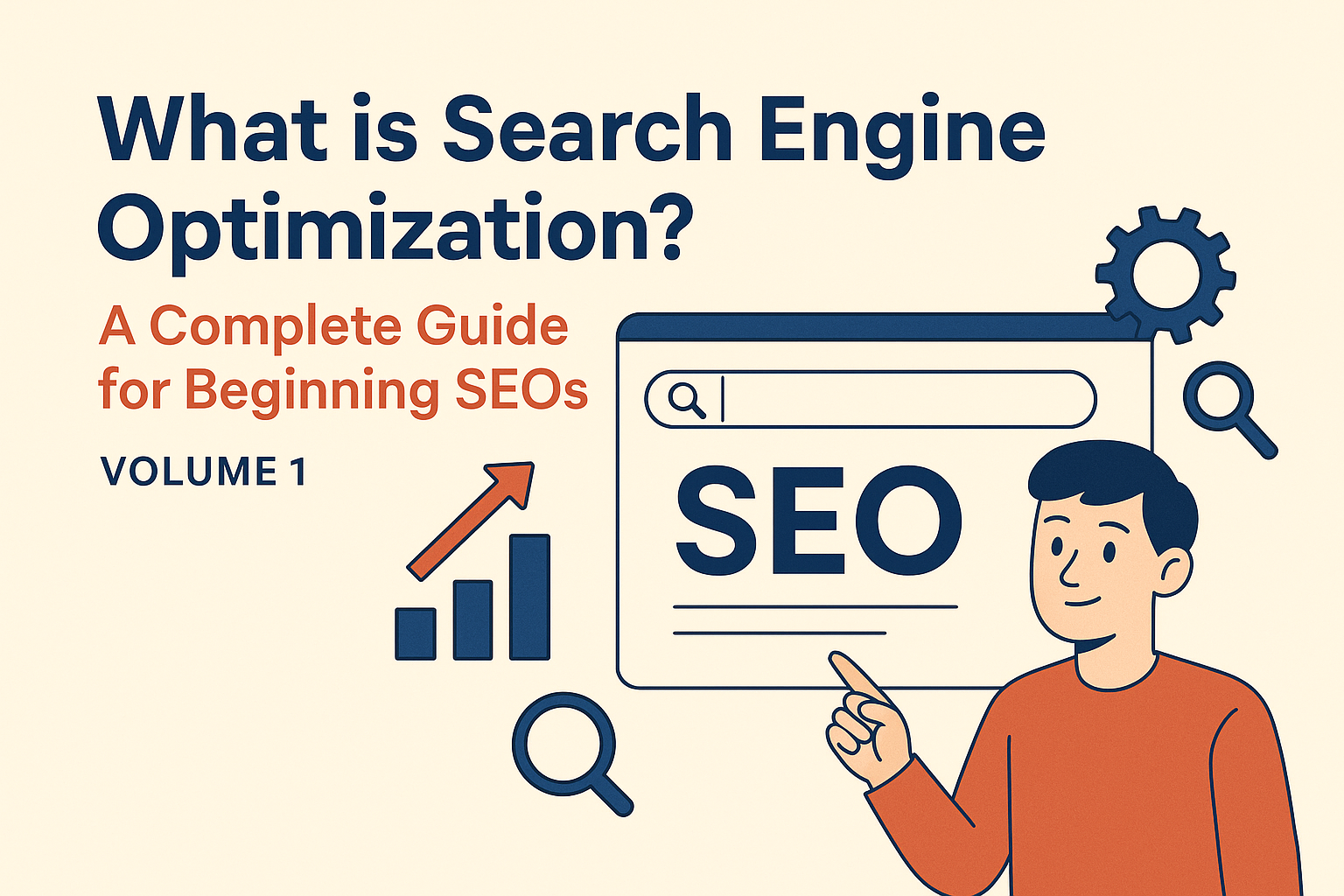
Introduction: The Invisible Website Problem
You’ve just invested thousands in a beautiful new website for your business. The design is stunning, the content looks professional, and you’re convinced customers will love it. But three months later, you’re staring at Google Analytics, wondering why nobody can find you online — and you start asking yourself, what is SEO and why does it matter?
Meanwhile, your competitor—who frankly has an uglier website and offers inferior service—is somehow ranking on the first page of Google for every search term that matters to your business. They’re getting the calls, the leads, and the customers that should be yours.
If this scenario sounds familiar, you’re not alone. I’ve been analyzing websites and helping businesses improve their online visibility for over 25 years, and this scenario plays out more often than you might think. The missing piece isn’t your product, your service, or even your website—it’s search engine optimization, better known as SEO.
Search engine optimization is the bridge between having a great business and having customers actually find that great business online. And despite what you might have heard, it’s not magic, it’s not dead, and it doesn’t require a computer science degree to understand. If you’re considering outside help, here’s a quick primer on how to choose the right SEO agency.
What Exactly Is Search Engine Optimization?
Let me explain SEO using an analogy that makes sense. Think of Google as the world’s most efficient librarian, and the internet as the largest library ever created. Every day, millions of people walk up to this librarian and ask questions: “Where can I find the best pizza near me?” “How do I fix a leaky faucet?” “What’s the most reliable HVAC company in Dallas?”
SEO is the process of organizing your website’s information so that when someone asks the Google librarian a question related to your business, your website gets recommended as one of the best answers.
SEO isn’t about gaming the system or tricking search engines. The best SEO strategies focus on genuinely helping real people find exactly what they’re looking for at the moment they need it most. When someone searches “emergency plumber near me” at 11 PM on a Sunday, they have a very specific, urgent need. Good SEO ensures your business shows up when you can actually solve their problem.
This philosophy has guided my approach throughout my career. Rather than chasing shortcuts or trying to manipulate rankings, the most successful SEO strategies I’ve implemented focus on genuinely serving customers better. It’s about connecting the right people with the right solutions at exactly the right moment.
Why Your Business Needs SEO
According to recent research, over 90% of online experiences begin with a search engine. That means when people need what you offer, they’re starting their journey by asking Google, Bing, or another search engine to help them find it.

This highlights one of the most important advantages of SEO: it brings you qualified traffic. Unlike interruption-based advertising, which reaches out to people who may or may not need your services, SEO connects you with individuals who are already searching for solutions you provide.
When someone searches “emergency dental care,” they’re not browsing casually—they have a specific, immediate need. When someone searches “best family dentist near me,” they’re actively evaluating options. These searches represent people with a genuine intent to make a decision, and that’s exactly the kind of traffic that builds businesses.
In my 25+ years working with businesses of all sizes, I’ve consistently seen that companies that invest in SEO build more sustainable, profitable customer acquisition systems than those who rely solely on paid advertising. While paid ads stop bringing traffic the moment you stop paying, good SEO continues working for you around the clock.
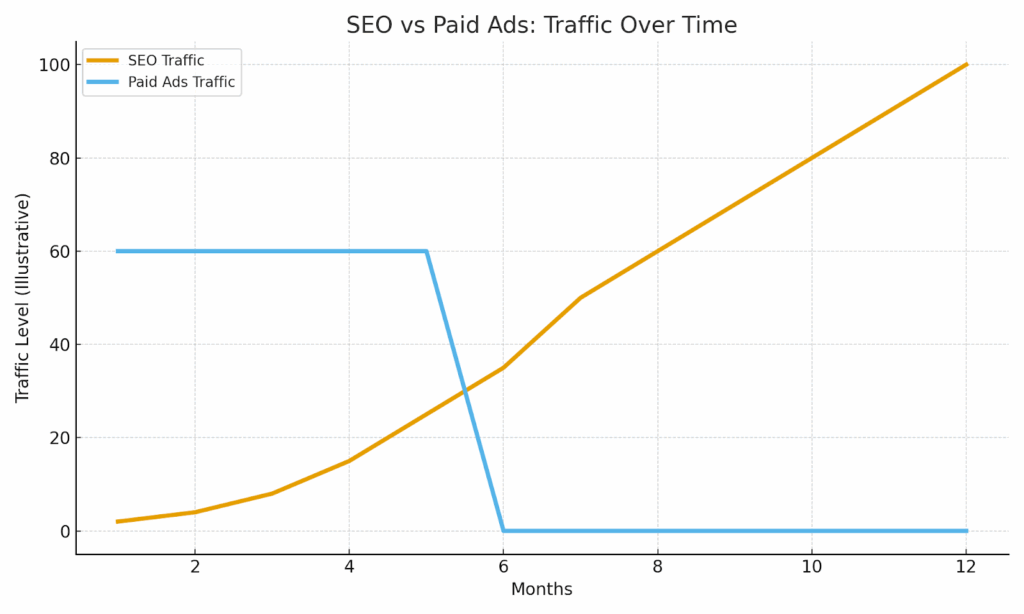
How Search Engines Work (Simplified)
To understand why SEO matters, you need to understand how search engines actually work. Think of Google as managing three distinct operations, like an incredibly sophisticated librarian running the world’s largest library.
First, there’s crawling—imagine digital scouts that continuously roam the internet, discovering new pages and updates to existing pages. These crawlers follow links from page to page, cataloging what they find. If your website isn’t accessible to these crawlers, or if they can’t understand your content, you’re essentially invisible to search engines.
Next comes indexing, which is like creating detailed catalog entries for every piece of content discovered during crawling. Google doesn’t just note that your page exists—it analyzes your content, understands the topics you cover, identifies the questions you answer, and determines how your page relates to millions of other pages on similar topics.
Finally, there’s ranking—the process of deciding which pages to recommend when someone performs a search. This is where Google acts most like a librarian, using hundreds of factors to determine which pages best match what the searcher is looking for. Factors include the relevance of your content, the authority of your website, how fast your pages load, and whether your site provides a good user experience.

Understanding this process is crucial because it explains why effective SEO requires attention to multiple areas. You can’t just focus on keywords and expect results—you need to ensure search engines can find and understand your content, and you need to demonstrate that your website deserves to be recommended over competitors.
The Five C’s Framework: Your Complete SEO Strategy
Over my years in this industry, I’ve developed a framework that I call the Five C’s of SEO. This systematic approach covers all the essential elements that search engines evaluate, and I’m confident that businesses that execute all five pillars better than their competition will outrank those competitors.

Code: The Technical Foundation
The first C stands for Code—the technical foundation that makes everything else possible. Think of this as the infrastructure that supports your entire SEO strategy.
Site Speed and User Experience: Your website needs to load quickly on all devices. Google has made it clear that page speed is a ranking factor, but more importantly, slow websites frustrate users. If someone searches for your services and your page takes five seconds to load, they’re likely to hit the back button and choose a competitor. I recommend aiming for page load times under three seconds, with under two seconds being ideal.
Mobile Responsiveness and Mobile First Indexing: With Google’s mobile-first indexing, your website must work perfectly on smartphones and tablets. This isn’t just about making text readable on smaller screens—your entire user experience needs to be optimized for mobile users. Navigation should be intuitive, buttons should be easily clickable, and content should be easily consumable on any device.
Site Architecture and Navigation: Your website should be organized logically, making it easy for both users and search engines to understand your content hierarchy. Every page should be reachable within a few clicks from your homepage, and your navigation should clearly indicate what visitors will find in each section.

Technical SEO Elements: This includes properly structured URLs, XML sitemaps that help search engines understand your site structure, schema markup that provides additional context about your content, and proper handling of redirects and error pages.
Here’s my honest recommendation: unless you have significant technical experience, consider getting professional help with the technical aspects of SEO. While you can handle many SEO tasks yourself, technical issues can seriously impact your results, and they’re often difficult to diagnose without experience.
Let me share a story that illustrates why technical SEO can be tricky even for experienced professionals. I was working with Hilton Hotels when someone in their IT department decided Google was crawling their site too frequently, so they added a file that prevented Google from indexing the site properly. This tanked their search rankings, and we couldn’t figure out why for weeks. The robots.txt file (which tells search engines what they can and can’t access) had been fine when we started working together, but the IT team added restrictions after we began our campaign. It’s not something I typically check more than once at the beginning of a project. When we finally discovered what happened and fixed it, their rankings skyrocketed. Even with decades of experience, some technical issues can be hard to anticipate and diagnose.
Content: Demonstrating Your Authority
The second C is Content—and this is where you demonstrate your expertise, authoritativeness, and trustworthiness in your field. Google evaluates what it calls E A T (Expertise, Authoritativeness, Trustworthiness), and your content is the primary way you demonstrate these qualities.
Proving Your Expertise: Your content should clearly demonstrate that you know what you’re talking about. This means going beyond surface-level information to provide insights that only someone with genuine experience would know. Share specific experiences, lessons learned, and practical advice that showcases your real world knowledge.
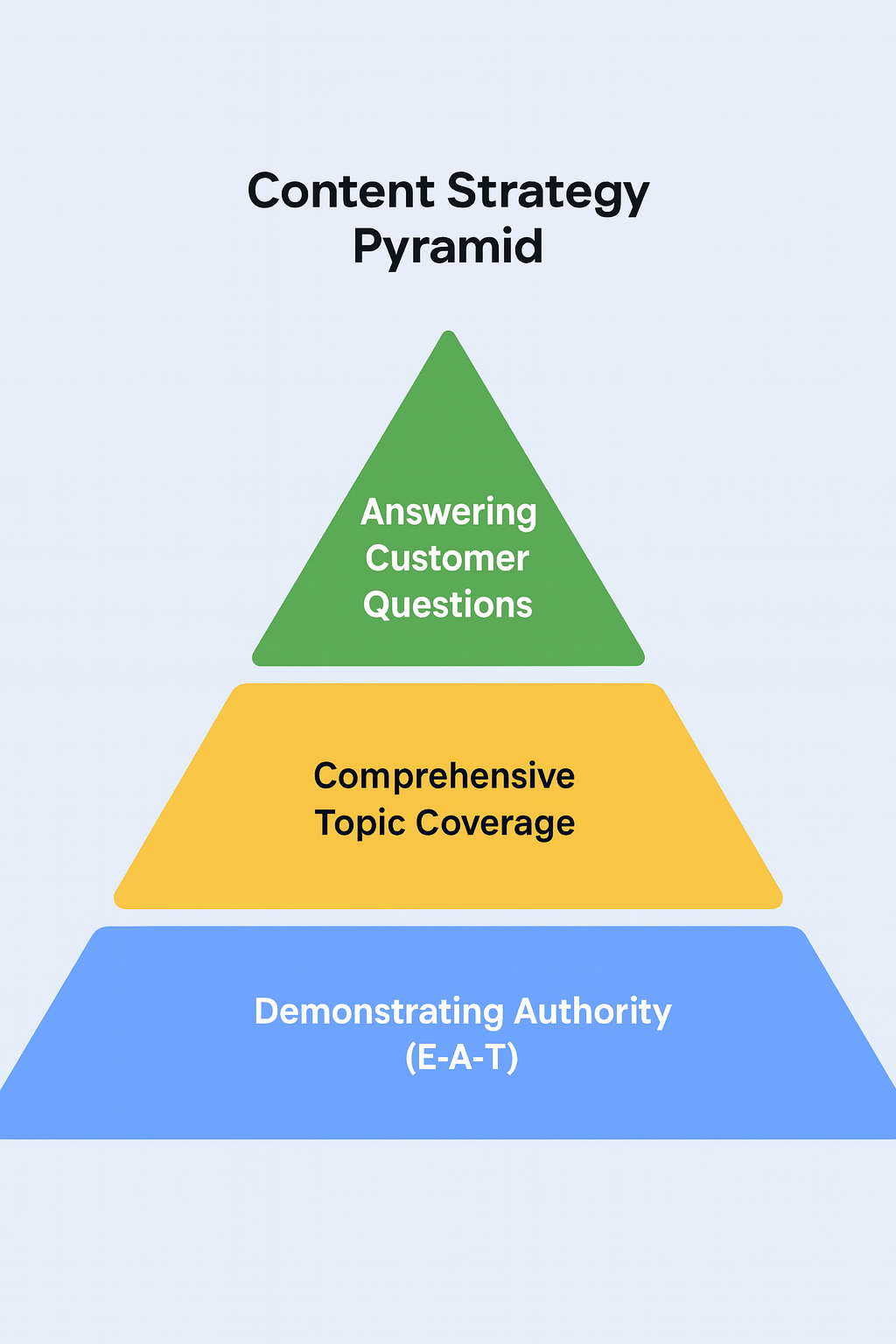
Comprehensive Topic Coverage: Rather than creating thin pages that barely scratch the surface, focus on thoroughly covering topics that matter to your customers. Create comprehensive resources that address specific questions write down every question customers ask, whether in person, over the phone, or via email. These questions represent exactly what people are searching for online.
Regular Updates and Content Structure: Search engines favor websites that regularly publish fresh, relevant content and organize it in a clear and well-structured manner. Use clear headings, logical flow, and a structure that makes your content easy for both users and search engines to understand.
Connections: Building Your Digital Network
The third C stands for Connections the links and relationships that establish your website’s authority in your industry. Think of links as professional referrals in the digital world.
Quality Over Quantity Principle: A single link from a highly respected, relevant website is worth more than dozens of links from low quality directories or unrelated sites. Focus on earning links from sources that your customers would recognize and trust.
Relevance and Authority of Linking Sites: The best links come from websites that are both authoritative in general and relevant to your industry. Links from trade associations, respected industry publications, or well known organizations in your field carry significant weight.
Natural Link Building Through Valuable Content: The most effective approach to link building is creating content and resources that naturally attract links because they provide genuine value. This might include original research, comprehensive guides, useful tools, or unique insights that other websites would like to reference.
Local Connections for Local Businesses: For businesses serving specific geographic areas, connections within your local market are particularly valuable. This includes links from local business organizations, the chamber of commerce, community websites, local news publications, and other businesses you partner with.
Communication: Leveraging Social Media Strategically
The fourth C is Communication—using social media and other platforms to amplify your content and build relationships, but with a crucial strategic focus.
Using Social Media to Drive Traffic to Your Website: Here’s a key principle I always emphasize: use social media to drive traffic to your website, not to keep people trapped on social platforms. Your website is where conversions happen, where you control the user experience, and where you can fully demonstrate your expertise.
Content Amplification Strategies: Social media should serve as a distribution channel for your valuable content. Share snippets, insights, or teasers that encourage people to visit your website for the complete information.
Community Building and Relationship Development: Social platforms excel at relationship building. Use them to connect with other professionals in your industry, engage with potential customers, and establish yourself as a knowledgeable resource in your field.
Social Proof and Brand Awareness: While social media signals may not directly impact search rankings, they contribute to brand awareness and social proof, which can lead to more searches for your brand name and more direct traffic to your website.
Multi Platform Presence Without Spreading Thin: Choose the platforms where your customers actually spend time, and focus on doing those well rather than trying to maintain a presence everywhere.
Capture: Understanding Your Data
The fifth C stands for Capture—understanding your data and using analytics to guide your SEO strategy. Think of analytics as the GPS for your business, helping you understand where you’ve been and where you need to go.
Analytics as Your Business GPS: Just like you wouldn’t drive to an unfamiliar destination without GPS, you shouldn’t run SEO campaigns without proper analytics. Data helps you understand what’s working, what isn’t, and where to focus your efforts for maximum impact.
Key Metrics to Monitor: Focus on metrics that truly matter to your business, including organic traffic growth, keyword rankings for terms that drive qualified visitors, user behavior on your site, and, most importantly, conversions and business results from your SEO efforts.
Conversion Tracking and Business Results: Rankings and traffic are nice, but what matters is whether your SEO efforts are generating actual business results. Set up proper conversion tracking to understand which pages, keywords, and strategies are driving real customers.
Technical Performance Monitoring: Keep an eye on technical metrics like page load times, crawl errors, and mobile usability issues. These factors can significantly impact your search performance.
Monthly Review Recommendations: I recommend monthly reviews of your SEO data to identify trends, spot issues early, and make strategic adjustments to your approach.
Common SEO Myths Debunked
I’ve heard just about every SEO myth imaginable. Let me set the record straight on some persistent misconceptions.
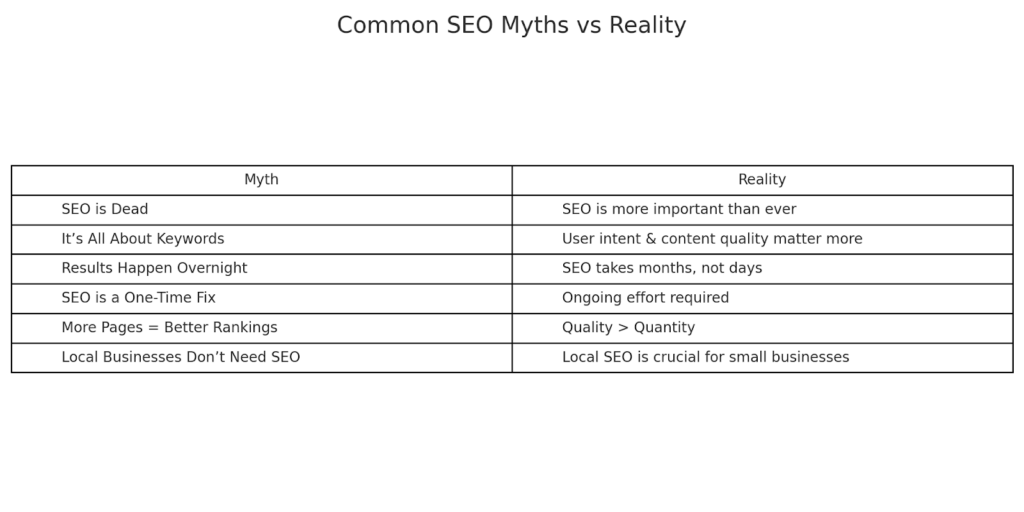
“SEO is Dead”: This is actually more important than ever. As the internet becomes more crowded and competitive, businesses that understand SEO have a significant advantage over those that don’t. The fundamentals may evolve, but the need to help customers find you online isn’t going anywhere.
“It’s All About Keywords”: While keywords matter, content quality and user intent are far more important. Google has become incredibly sophisticated at understanding what people actually want when they search, not just matching exact keyword phrases.
“Results Happen Overnight”: SEO is a long-term strategy. Anyone promising overnight results is either lying or using tactics that could get your website penalized. Real SEO success builds over months and years, not days or weeks.
“SEO is a One-Time Fix”: This is an ongoing effort that requires consistent attention. Search engines continuously update their algorithms, your competitors are working to improve their rankings, and your industry evolves. Successful SEO requires ongoing effort.
“More Pages Equal Better Rankings”: Quality matters far more than quantity. A well-optimized website with 50 excellent pages will typically outperform a site with 500 mediocre pages.
“Local Businesses Don’t Need SEO”: Local search is actually one of the most important applications of SEO. When people search for services “near me” or in specific cities, local SEO determines who shows up in those crucial search results.
Setting Realistic Expectations: SEO Timeline
One question I get asked frequently is, “How long does SEO take to work?” The honest answer is that it depends on many factors, but here’s a realistic timeline based on my experience:
Weeks 1 4: Foundation Setting: During the first month, you’re primarily setting foundations and making initial optimizations. Don’t expect significant visible results yet, but important work is happening behind the scenes.
Months 2 3: Search Engine Understanding: Search engines begin to understand your site’s focus and start indexing your optimized content. You may see small improvements in rankings and traffic.
Months 4 6: Significant Improvements Become Visible: This is typically when clients start seeing meaningful improvements in their search rankings and organic traffic. The compound effect of your earlier efforts begins to pay off.
Months 6 12: Meaningful Business Results: By this point, well-executed SEO strategies should be driving measurable business results—more leads, phone calls, and customers from organic search.
Year 2 and Beyond: Competitive Advantage and Compound Growth: Established SEO strategies create compound returns. Your content library grows, your authority increases, and your competitive position strengthens significantly.
Timeline variations depend on factors such as industry competitiveness, the current state of your website, available resources, and the consistency with which you execute your strategy.
DIY vs. Professional Help: What You Can Handle vs. When to Get Help
This is one of the most practical questions business owners ask, and I believe in providing honest guidance about what you can realistically handle on your own versus when you need professional help.
What Business Owners Can Handle
Basic Keyword Research: Tools like Google’s Keyword Planner, Ubersuggest, or even Google’s autocomplete suggestions can help you identify what your customers are searching for.
Content Creation: You know your business better than anyone. You can create content that answers customer questions, showcases your expertise, and addresses the needs of your target market.
Page Title Optimization: Writing compelling, keyword-rich page titles is something most business owners can learn to do effectively.
Google Business Profile Management: Keeping your Google Business Profile updated with accurate information, regular posts, and responding to reviews is crucial for local SEO and entirely manageable.
Social Media Presence: Building relationships and sharing valuable content on social platforms is something you can do yourself, though it takes time and consistency.
What Usually Requires Professional Help
Technical SEO Audits and Fixes: Diagnosing and resolving issues with site speed, crawlability, mobile optimization, and technical infrastructure often requires specialized knowledge.
Advanced Competitive Analysis: Understanding what your competitors are doing right and identifying opportunities requires sophisticated tools and experience in interpreting the data.
Link Building Strategies: Effective link building requires relationships, industry knowledge, and understanding of what constitutes quality versus risky linking practices.
Large-Scale Content Strategy: Developing comprehensive content strategies that target multiple customer segments and buying stages benefits from professional expertise.
Website Migrations: Moving websites, changing domain names, or major restructuring projects carry significant SEO risks that require professional management.
Signs You Need Professional Help
Technical Issues Beyond Your Expertise: If your website has significant technical problems affecting its performance or search engine accessibility.
Highly Competitive Industry: In very competitive markets, professional level strategy and execution often make the difference between success and struggle.
Limited Time: Effective SEO requires a significant time investment. If you can’t dedicate at least 10 hours per week to SEO activities, professional help becomes valuable.
6+ Months of DIY Attempts Without Results: If you’ve been working on SEO for six months or more without seeing meaningful improvements, it’s time to get professional guidance.
Business Heavily Dependent on Online Visibility: If online visibility is crucial to your business success, the investment in professional SEO often pays for itself quickly.
Getting Started: SEO Success Checklist
Here’s a systematic approach to getting started with SEO using the Five C’s framework:

Step 1: Current Situation Audit
- Analyze your current website performance using Google Analytics and Google Search Console
- Identify technical issues that might be holding you back
- Review your current content and identify gaps
Step 2: Keyword Research
- List the services you offer and the problems you solve
- Research what terms your customers actually use when searching
- Identify both broad industry terms and specific, local search phrases
Step 3: Technical Foundation Optimization
- Ensure your website loads quickly on all devices
- Verify that your site is mobile friendly
- Set up proper analytics and search console accounts
- Create or update your XML sitemap
Step 4: Valuable Content Creation
- Start that customer question notebook I mentioned earlier
- Create comprehensive pages that thoroughly address customer needs
- Regularly publish fresh content that demonstrates your expertise
- Optimize your content with relevant keywords, but prioritize readability and value
Step 5: Online Presence Building
- Claim and optimize your Google Business Profile
- Build relationships with other local businesses and industry organizations
- Use social media strategically to drive traffic back to your website
- Focus on earning links naturally through valuable content and relationships
Step 6: Monitoring and Adjustment
- Set up monthly reviews of your SEO performance
- Track both search engine metrics and business results
- Adjust your strategy based on what’s working and what isn’t
- Stay informed about industry changes and algorithm updates
Frequently Asked Questions About SEO
How long does SEO take to work? As I covered in the timeline section, you’ll typically see meaningful improvements in 4 6 months, with significant business results in 6 12 months. Anyone promising faster results should be viewed with skepticism.
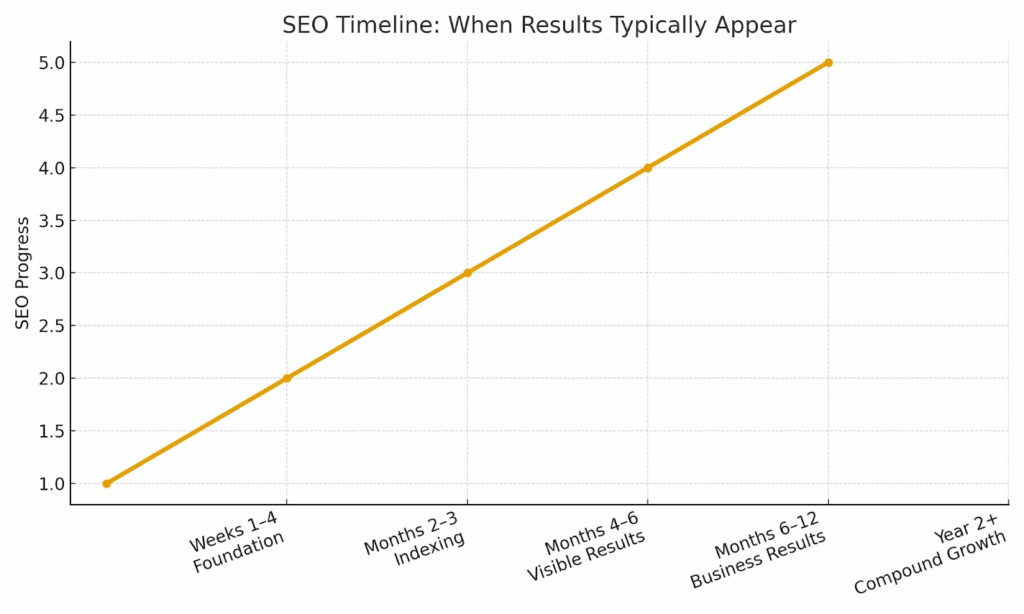
What’s the difference between SEO and paid ads? SEO focuses on earning visibility in organic (non paid) search results through valuable content and technical optimization. Paid ads buy immediate visibility but stop working when you stop paying. SEO builds long term value.
How much does SEO cost for a small business? This varies widely depending on your industry, competition, and whether you do it yourself or hire professionals. DIY approaches cost mainly time, while professional SEO services can range from a few hundred to several thousand dollars monthly.
Can I do SEO myself or do I need to hire someone? You can handle many SEO basics yourself, especially content creation and basic optimization. However, technical issues, competitive markets, and complex strategies often benefit from professional expertise.
What’s the most important SEO factor for beginners? Focus on creating genuinely valuable content that answers your customers’ actual questions. This single factor will drive more long term success than any technical trick or shortcut.
How do I know if my SEO is working? Monitor both search engine metrics (rankings, organic traffic) and business results (leads, calls, sales from organic search). The latter matters more than the former.
Is SEO still relevant in 2025? Absolutely. As long as people use search engines to find information and solutions, SEO will continue to be crucial for businesses that want to be found online.
What’s the difference between SEO and search engine marketing? SEO specifically focuses on organic (non-paid) search results. Search engine marketing (SEM) includes both SEO and paid search advertising, like Google Ads.
Conclusion: Why SEO Is Worth the Investment
I can confidently say that SEO represents one of the best long-term investments a business can make in its marketing. Unlike paid advertising, which stops working the moment you stop paying, good SEO continues generating results around the clock.
SEO is a compound investment. The content you create today continues attracting customers months and years later. The authority you build accumulates over time, making it easier to rank for competitive terms. The relationships you develop through your online presence create ongoing opportunities for growth and development.
But perhaps most importantly, SEO forces you to focus on genuinely serving your customers better. When you optimize your website for search engines by answering customer questions, solving their problems, and making information easy to find, you’re not just improving your rankings—you’re improving your business.
The businesses that thrive online aren’t necessarily those with the biggest budgets or the fanciest websites. They’re the businesses that consistently help their customers find exactly what they need, exactly when they need it. That’s what good SEO accomplishes, and that’s why it’s worth the investment.
My advice? Start with the basics, be patient with the process, and don’t hesitate to seek professional help when you need it. The internet isn’t getting less competitive, but businesses that commit to doing SEO right will continue to reap the rewards for years to come.
Tony Wright is the CEO of WrightIMC and has been helping businesses improve their online visibility since 1997. He’s a regular contributor to Search Engine Journal and has spoken at major industry conferences including Pubcon, SMX, and Digital Summit. You can find more of his insights at WrightIMC.com.
What is SEO?
SEO, or Search Engine Optimization, is the process of improving your website so search engines like Google can easily find it and show it to people looking for what you offer.
Why does my business need SEO?
Over 90% of online experiences start with a search engine. SEO makes sure your business appears when potential customers are actively looking for your products or services.
How long does SEO take to work?
Most businesses begin seeing improvements within 4–6 months, with stronger traffic, leads, and sales typically showing after 6–12 months. SEO is a long-term investment.
Can beginners do SEO themselves?
Answer: Yes. Beginners can handle basics like keyword research, writing helpful content, optimizing page titles, and updating a Google Business Profile. Technical tasks may need professional help.
What is the difference between SEO and paid ads?
Answer: SEO focuses on earning free, long-term visibility in organic search results. Paid ads deliver instant visibility but only work while you keep paying. A smart strategy often combines both.
Comments